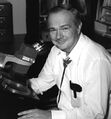April 28: Difference between revisions
(Created page with "{{Selected anniversaries/April 28}}") |
No edit summary |
||
| Line 1: | Line 1: | ||
'''Are You Sure ... (April 28)''' | |||
{{Are_You_Sure/April_28}} | |||
<br style="clear:both"> | |||
[[File:Are You Sure (April 28, 2020).png|thumb|left|Screenshot: Are You Sure (April 28, 2020)]] | |||
<br style="clear:both"> | |||
'''On This Day in History and Fiction''' | |||
{{Selected anniversaries/April 28}} | {{Selected anniversaries/April 28}} | ||
Revision as of 03:56, 28 April 2020
Are You Sure ... (April 28)

The text under the complete photograph reads:
"Adele Porkert and Gödel were an unlikely but devoted couple. This photograph, taken at an outdoor Viennese cafe, is from the period of their long courtship. Porkert shielded Gödel from the worst of his irrational fears, and was often the only person who could persuade him to eat. More than anyone else, she was responsible for keeping him alive and productive."
After his wife's hospitalization in 1977, Gödel stopped eating and starved to death.
• ... that logician, mathematician, and analytic philosopher Kurt Gödel (1906–1978) shocked his colleagues with his incompleteness theorems, which use mathematical logic itself to prove that mathematical logic (which might be thought of as the science of being certain) is inherently subject to uncertainty; that Gödel's work shook mathematics to its foundations, establishing fundamental principles of modern thought; and that Gödel suffered periods of mental instability and illness, with an obsessive fear of being poisoned, eventually eating only food that his wife, Adele, prepared for him; and that after her hospitalization in 1977, when she could no longer prepare her husband's meals, he starved to death?
• ... that physicist and engineer Rolf Landauer (1927–1999) made important contributions to the thermodynamics of information processing, including the principle that in any logically irreversible operation that manipulates information, such as erasing a bit of memory, entropy increases and an associated amount of energy is dissipated as heat, a phenomenon now known as Landauer's principle?
• ... that geometrical frustration (or simply frustration) is a phenomenon in condensed matter physics where atoms tend to stick to non-trivial positions or where, on a regular crystal lattice, conflicting inter-atomic forces (each one favoring rather simple, but different structures) lead to quite complex structures, and that as a consequence of the frustration in the geometry or in the forces, a plenitude of distinct ground states may result at zero temperature, and usual thermal ordering may be suppressed at higher temperatures?
• ... that mathematician Leopold Kronecker (1823–1891) was quoted by Heinrich Martin Weber (1893): "Die ganzen Zahlen hat der liebe Gott gemacht, alles andere ist Menschenwerk" ("God made the integers, all else is the work of man")?
On This Day in History and Fiction
1693: Gottfried Wilhelm Leibniz writes to L'Hospital, announcing his discovery of determinants fifty years before Cramer, who was the real driving force in the development of determinants. Leibniz's work had little or no influence because it was not published until 1850 in his Mathematische Schriften.
1774: Astronomer Francis Baily born. He will observe "Baily's beads" during an annular eclipse (1836).
1817: Carl Friedrich Gauss writes to the astronomer H. W. M. Oblers, saying, "I am becoming more and more convinced that the necessity of our (Euclidean) geometry cannot be proved, at least not by human intellect nor for the human intellect."
1868: Mathematician Georgy Voronoy born. He will invent what are today called Voronoi diagrams or Voronoi tessellations.
1906: Mathematician, philosopher, and academic Kurt Gödel born. His two incompleteness theorems will have an immense impact upon scientific and philosophical thinking in the 20th century.
1928: Geologist and astronomer Eugene Merle Shoemaker born. Shoemaker will be the first scientist to conclude that Barringer Meteor Crater in Arizona, and similar craters, were caused by meteor impact.
1986: High levels of radiation resulting from the Chernobyl disaster are detected at a nuclear power plant in Sweden, leading Soviet authorities to publicly announce the accident.
1999: Physicist and engineer Rolf Landauer dies. Landauer discovered that in any logically irreversible operation that manipulates information, such as erasing a bit of memory, entropy increases and an associated amount of energy is dissipated as heat. This phenomenon is now known as Landauer's principle.








